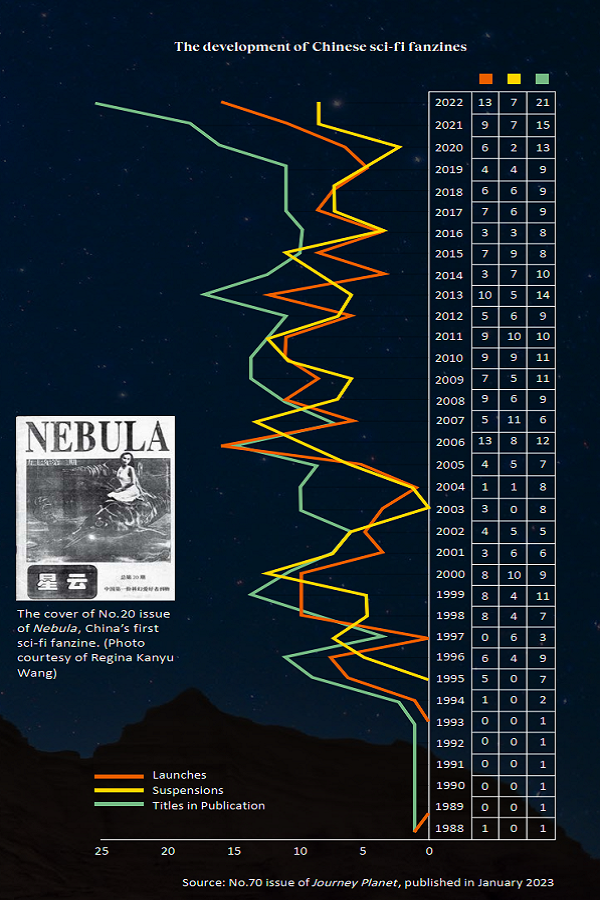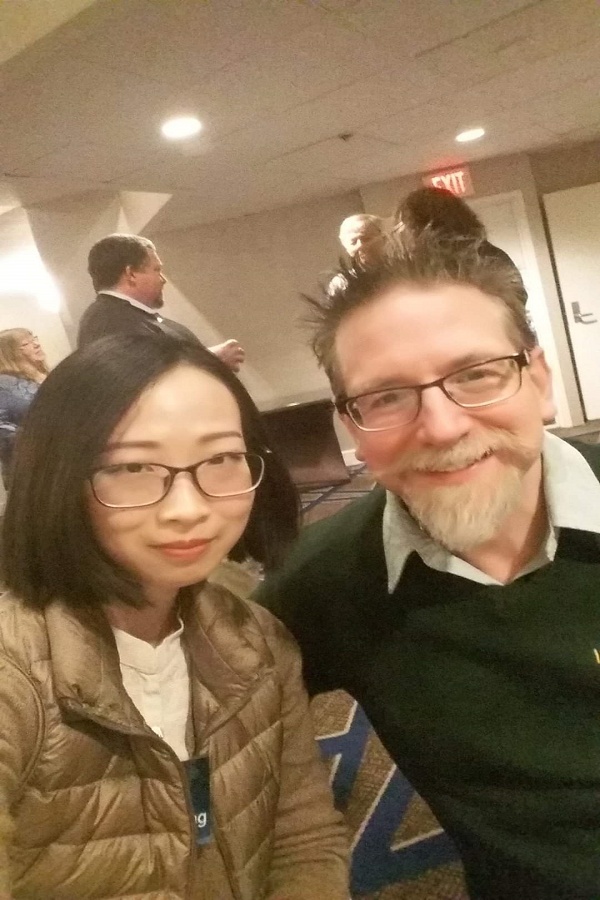Fanning the Sci-Fi Flames

Rumble, rumble, rumble… When James Bacon finishes his shift conducting trains at London Paddington Railway Station, his brain really starts to gain steam. Then leisure time? Yes-and-no. Bacon plans to devote time to editing Journey Planet, the Hugo Award Best Fanzine of 2015, and he feels “privileged to be able to edit it as a hobby.”
Two special bilingual issues of Journey Planet, published respectively in December 2022 and January 2023, were dedicated to “Chinese Science Fiction and Space.” More than 20 articles and interviews covered China’s science, science fiction, space exploration and fandom. Other editors working alongside Bacon included Christopher J. Garcia, Regina Kanyu Wang, Arthur Liu, and Yen Ooi.
“We produced a ‘Russia Space’ themed bilingual issue in 2021, which was quite popular,” said Bacon. “Then we realized that considering how much interesting sci-fi and creativity was coming out of China, an issue dedicated to China’s sci-fi and space exploration was long overdue!”

The cover of No.68 issue of Journey Planet, from Ocean in the Sky by Sharksden. (Photo courtesy of Regina Kanyu Wang)
Labor of Love
The kaleidoscope of topics in the two special bilingual issues included hidden treasures of Chinese sci-fi, reviews of sci-fi comics such as Split Earth by Joey Yu, Zephyr Zheng, and Monica Ding, and interviews with a sci-fi entrepreneur and visual artists. Contributors ranged from the former editor-in-chief of Science Fiction World (a monthly Chinese sci-fi magazine founded in 1979), senior scholars working on major programs funded by the National Natural Social Science Foundation of China, and Hugo Award-winning writers to college freshmen, young translators who just started their careers, and astronauts and artists who love science fiction. It surveyed the fan ecology outside organizing committees of sci-fi conventions and professional institutions.
One highlight was an article on the brief history of Chinese sci-fi fanzines. The development of Chinese sci-fi fanzines is a phenomenon structured in six distinct waves spanning more than three decades and 169 titles.

The first domestic sci-fi fanzine was Nebula, created by Yao Haijun in 1988, which published a total of 39 issues. It was the torchbearer for the first wave, which ran from 1994 until 1996. The second wave, lasting from 1998 to 2000, coincided with the heyday of Science Fiction World, which encouraged fans nationwide to embark on their own editorial endeavors. The ubiquity of the internet by 2006 contributed to the third wave, with most fanzines edited by netzines via online forums, such as Imaginary Flight, produced by FLYINE. In April 2009, Sanfeng, as editor-in-chief, initiated the fantasy literature magazine New Realms of Fantasy and Science Fiction, heralding the beginning of the fourth wave. The fantasy literature e-journal Buzhou, which premiered on May 8, 2014, primarily featured prestigious contributors. Publications of this kind eventually led to the fifth wave, which celebrated famous authors. On June 6, 2019, Sanfeng launched the online sci-fi periodical Nebula Science Fiction Reviews as a WeChat public channel, which published a total of 21 issues with the help of volunteers. This and similar publications led to the sixth wave, which is primed for further development.
“This article inspired me to figure out the history of sci-fi fanzines in my motherland of Ireland,” Bacon beamed. “A partnership with a Chinese fanzine at some stage in the future would also be amazing.”
The article also closed with a heartfelt recommendation: the Jiulong Project, a not-for-profit program devoted to digitalizing sci-fi fanzines named after Xu Jiulong, a late collector. It seeks to serve as “a historical publication archive for Chinese sci-fi, striving to preserve as many old fanzines electronically as possible to pay homage to a man who edited one issue of the fanzine Ladder Towards Sky in 1995.”
Contrasting professionally-edited sci-fi magazines, Journey Planet embraces a thematic approach welcoming fans to submit original material on a subject to connect people with different interests.
“There was no distinction between fans and professionals.” Ben Yalow, an American computer scientist and a programmer long affiliated with the City University of New York and sci-fi fandom, was quoted talking about the early days of the sci-fi community in the Editorials. “Writers also volunteered at sci-fi conventions, and they would welcome new fans to the community, who might later become writers as well.”
“That’s the kind of atmosphere I have long envisioned,” said co-editor Regina Kanyu Wang. “I think we have achieved that, at least in this issue.”

James Bacon (right) shares a cheerful moment with Regina Kanyu Wang, co-editor of the two special bilingual issues of Journey Planet dedicated to “Chinese Science Fiction and Space,” at 2017 SMOFcon in Boston of the United States. It’s an annual event that focuses on the organization of sci-fi conventions. (Photo courtesy of James Bacon)
Shining Fandom of Chinese Sci-Fi
Alongside fanzines, blogs, vlogs, podcasts, animation, and other forms of media are also shining parts of Chinese sci-fi fandom.
For instance, The Three-Body Problem in Minecraft displays a Three-Body Universe created by fans for the fans. After Liu Cixin’s The Three-Body Problem (first published in 2006) received the Hugo Award in 2015, Chinese sci-fi rose from a niche crowd to the mainstream. An animated series named The Three-Body Problem in Minecraft emerged out of nowhere in 2014. It was impressive artistically, and all members of its production team were fans of the original novel. They understood the allure of the original work and strived to present its hallmark features and iconic scenes. The foolishness and arrogance of mankind, the galactic battle of wits, and the vastness of the universe were all faithfully recreated in the animated series.
Through animation, the creators also established a Three-Body fandom that fostered creation of more fan music, character songs, and fan fiction. Gradual experimentation enabled the industry to test how hard-core science fiction could be adapted. Creators also helped the general public learn the value and potential of original content from the Three-Body Universe.

A still of The Three-Body Problem in Minecraft (2014), an animated series displaying a Three-Body Universe created by fans for the fans.
And Storycom International Culture Communication Co., Ltd., the first professional story commercialization agency in China established in 2013, has introduced fan funds such as the Shimmer Program Mutual-Communication Fund and the World Science Fiction Convention (Worldcon) Attending Fund to support exchange between Chinese and international fandoms. This year, the 81st Worldcon will be held from October 18 to 22 in Chengdu, Sichuan Province, marking its debut in China. As someone who worked very hard to bring the Worldcon to Ireland in 2019 for the first time, Bacon is excited for sci-fi fans in China.
“The fans in China are fabulous people,” he said. “I hope friendships will be formed, new aspects learned, and new works discovered there.”